- Home
- John Ellsworth
The Law Partners (Michael Gresham Legal Thriller Series Book 3) Page 2
The Law Partners (Michael Gresham Legal Thriller Series Book 3) Read online
Page 2
He folded and carefully placed his jeans and T-shirt and porkpie hat inside his bag.
Thirty minutes later, he heard her key in the door.
3
Stormont stationed himself behind the front door. Once she was inside and the door was closing behind her, he clutched her in a choke hold. It was simple to do as he simply overpowered her. Her legs fell out from beneath her as if she had been head shot.
He caught her as she lost consciousness and crumpled. He carried her gently to the sofa. He stretched her out on her back and straightened her dress. Neat and unmarked--exactly like he wanted her.
He returned to the door and retrieved her gold lamé purse from the carpet. As he knew it would be, her pistol was inside. He knew that his hands, inside latex gloves, would leave no prints on the gun so he withdrew it from the purse and placed the purse on the coffee table beside the unconscious woman.
It was but minutes until lobby security called on the intercom. He keyed the unit and replied in his best impression of a female voice that yes, security should send Darrell Harrow right up to her condo, she was expecting him. Lights were clicked off. He took a seat in the chair beside the unconscious woman.
In less than five minutes there was a rapping on the door. It sounded almost like scratching and maybe it was, he couldn't be sure.
Whatever, he called to the visitor to come on in, the door was unlocked.
The visitor stepped inside a room that was as dark as night. Suddenly a light flared on and he froze; the police officer had turned the switch on the table between his chair and the sofa. In one continuous move Stormont fixed Harrow in his gunsights and pulled the trigger. Those hundreds of hours at the police shooting range hadn't been wasted. The single round struck the startled man squarely between the eyes. They remained open while the rear of his head spattered against the wall in the pattern of a large red flower. He fell to the floor, twisting, coming to rest partially on his back, one leg crumpled beneath him, both arms at his sides. He stared at the ceiling with the unblinking concentration of the dead.
Plucking a small nugget of burnt wood from the fireplace, the police officer drew on the wall above the victim's head. He rubbed the charcoal on the unconscious woman's hands. Pulling a wooden cross from his pack, he placed it on the carpet just above the victim's head. He cast a look around the living room. It was coming together just as he’d planned.
He then placed the gun inside the prosecutor’s purse and placed that in her bedroom. Tucking his shoulder bag up under his arm, he pulled his cop hat low across his eyes and exited the condo.
The elevator lowered him to the basement of the condominium tower, down to the visitors' level, where the man stepped back into the shadows.
An hour later, he saw the black Mercedes arrive and take the only remaining visitor's slot. He watched as the lawyer exited the Mercedes and hurried for the elevators. Making him was easy: his license plate said SET U FREE.
Twenty minutes later, Stormont heard the sound of far-off sirens coming closer. When he heard the sirens shut down just outside the building’s entrance, he rode the elevator back up to the woman’s condo. His plan was to mix in with the arriving cops and enter the condo as one of them.
The uniform stationed at the entrance to the condo didn’t give him a second look when Stormont walked inside like he owned the place. The on-call detective told him, “I need you to search the premises. We’re looking for a gun.” He was made a part of the crime scene team.
Officer Stormont started at the far end of the condo, the woman’s bedroom. The rest was simple. He searched the woman’s purse and there was the gun. A moment of inspiration caught him up and he jammed the revolver into his rear pocket. It was a tight fit but he didn’t have time to worry about that. Just then, the lawyer came into the room and snapped his picture with his smartphone. Stormont turned and abruptly left. He then made his way downstairs to the parking garage. He exited the parking garage elevator and pressed his back to the wall and began making his way north.
He sidled along in the shadows until he was positioned directly beneath the CCTV camera. He reached above his head and turned the camera.
Alone at the rear of the black Mercedes, he jimmied the trunk with his picks and up it popped. He withdrew the gun from his back pocket. Behind the spare tire he placed the weapon. He was still wearing the same blue gloves he had worn while searching the woman’s condo. Now he slammed the trunk, took a step back, and snapped the gloves from his hands. They went into the pocket of his navy pants.
Stormont rode the elevator up to the lobby, walked through and came out onto Jefferson Street. He hurried off into the Chicago night.
Michael Gresham
4
"You have no idea how this happened?"
We are sitting in the living room of Cook County prosecutor Miranda—Mira—Morales. She was voted Top Female Lawyer in Chicago just last year and she is nobody's fool. But tonight a dead body is obtrusively stretched out on the shag with a bullet hole between the eyes, and she has no explanation for me, Michael Gresham, the lawyer she has called. Skull and soft tissue are spattered against the wall beside the front door. The eyes of the dead man are crossed, staring inward, as if gazing at the incoming round a split-second before the lights went out.
Assistant District Attorney Mira Morales is a woman of thirty-three years. She has invested the past ten years of her life achieving a trial record of 70-1. It's a world-class record and she is counting on it to win her the job of District Attorney in the November election. Her boss has announced his retirement and his return to private practice from whence he came some twenty-five years ago. The vacancy has attracted a crowded field of District Attorney wannabes in the Democrat primary election. Her competition is unaccomplished and mostly unelectable, as Mira Morales is the only career prosecutor among them. On the Republican side there is but one candidate, Lamont R. Johnstone. Until three months ago, Johnstone was the District Attorney's First Assistant. He jumped ship in order to run against his boss. But then his boss announced he was retiring.
She raises a hand to say something to me when an involuntary shudder wracks her body. It is only then that I realize I've been staring at her. Her skin tones are dark browns and deep ferrous hues. Her long, thin nose and violet eyes are stunning and I cannot stop staring. Everywhere in Cook County you will spot pictures of this beauty staring out from her campaign posters while shaking the hand of the Chief Justice of the Illinois Supreme Court. But even those posed shots understate her elegance. She is beautiful beyond any woman I've seen in years. But right now she is jangled and her hands shake and her voice falters as I try to question her.
"Mira, what happened here?"
She only looks at me. Her mouth opens and shuts but there are no words.
I am very tempted to call the police and give notice of the murder this minute, but Marcel, my investigator, is smartly holding me back. He's doing this to give us time to properly prepare the scene and the District Attorney candidate. Once the police are notified and the press intercepts the call, Mira's life will come crashing down around her. The election will likely be lost when the newspapers hit the streets. But right now it appears she'll be the last to know, as she sits on the couch wrapped in a fuzzy blanket, her face a blank, shut off from the world.
Her eyes close and remain that way. Marcel looks at me and shrugs. We both look at our newest client. She is still wearing the little black dress and string of pearls that carried her night at the annual Cook County Democratic Party Dinner kicking off the campaign season. It is July and elections are just four months off.
Her eyes open and swim back to reality. She focuses on me, the attorney she called when she realized there was a dead body in her living room. I say "realized," because Mira is claiming she was in a blackout when the shooting occurred. Of this she is certain: the dead body wasn't on her floor when she returned home from the dinner. She knows this to be a fact because she remembers coming inside her condo and
locking the door behind her. The next thing she knew she was coming awake on her sofa. She sat up, dizzy and faint, and that's when she saw the body. She instantly recognized the man.
She lives alone, a single woman without children, a woman known in Chicago legal circles as a willing sleepover partner and Chicago's very own Escoffier of intimate, morning-after brunch.
"Are you sure you hadn't invited him home with you?"
"I did not invite him. We argued at the fundraiser and I came home alone."
"Did anybody see you arguing?"
"Only everyone, I imagine. He was loud and under the influence."
Under the influence, I am thinking. Only a prosecutor would say under the influence. The rest of the unwashed--which includes me--would say he was drunk. Or maybe knee-walking. Or toasted. Under the influence? Only if we'd watched too much TV. No, Mira was a hands-on prosecutor, the kind who had learned the ropes by trial and error, and her words, while sparse, were always informed, always precise. That was the Mira Morales I knew from having defended three jury trials against her. We had each won one then split the third on a hung jury that went away on a plea after the smoke cleared. The score was tied, so she felt she was neither stooping nor reaching when she called me. I am known for being nuts-and-bolts in my trial practice. I am also known for smoke-and-mirrors. Mira evidently felt like she needed a helping of each. But for right now, the nuts-and-bolts lawyer will help her prepare for the arrival of the police once I put in the call to advise of a dead body in my client's living room. My goal is to shield her from all questions and to guide the inquiry away from her.
If I can do that, it's a first-round win.
5
Not ten minutes after my arrival we are joined by my investigator, Marcel Rainford. Marcel has been with me seven years, a one-time employee of Interpol and Scotland Yard. We crossed paths during that time. He was transplanted to America after a contract was issued on his life by a group of Sicilian Mafiosi upset with the inroads he had made on their European heroin kingdom. The U.S. State Department was instrumental in changing Marcel's surname and hiding his real identity in its cloistered terabytes of bureaucracy. He signed on with Chicago Police Department when he arrived stateside; two years later, he received medical retirement after being shot in the face on a routine robbery call. The wound left him disfigured even after six surgeries. But it didn't affect his investigator's bent for justice and truth--two character defects in my world of criminal defense. But he works hard to overcome his better self. The fact of the matter is Marcel has crossed the line separating fact from fiction, as did I long ago when I became counsel for my first criminal client. We both are able to lie with ease. Criminal defense practice demands no less. Just now he is taking pictures of the scene with his Nikon.
He finishes up and turns to Mira and asks her to hold out her hands, palms up. She obliges, and he racks off maybe ten snaps on the camera. Then she's instructed to turn them over and he makes a recording of the top side. While the hand baseline is being set in this manner, I make a mental note. Her hands are blackened, sooty. I look back at the entrance wall. There is a large Satanic pentagram drawn there. It is done in what appears to be charcoal. Such as we have just recorded on her hands.
"Marce," I tell him softly. "Flip back through. Get rid of all the pictures of her hands."
He looks at me with a silent question. I roll my eyes to the wall drawing. He follows. The light goes on in his eyes. He immediately begins flipping back through his snaps. His fingers punch and the camera clicks and snapshots disappear. We know we must be very selective in what is preserved and what is disappeared.
Mira pulls an ashtray across the coffee table and manages, with shaking hands, to insert a Salem between her full, red lips and bring a flame to the business end of the tobacco. She inhales and the cigarette glows.
I ask again, "You have no idea how this happened?"
"Michael," she manages at last, "one moment I was out and the next moment I was conscious and aware. How he got there, I have no idea, I swear to you."
"It's Darrell Harrow?" I ask.
She nods and says heavily, "It is Darrell Harrow."
“Who hated him?” I ask.
She shrugs. “He's well-known around town and very well-liked.”
My mind switches gears.
"So we need to figure out why Darrell, a married man, was in your condo tonight. Can you help me with that?” I cannot fend off my own sarcasm: of course she can help me—she had been bedding the guy.
Marcel looks up. "Let's try this. What do you remember?"
"I remember unlocking my door.”
"What happened next?”
"That's the sixty-four-dollar question. I don't know."
"You regularly carry a gun?" Marcel asks.
"Yes. Our homicide prosecutors are armed. It goes with the job."
"Sure. So do you remember going for your gun tonight?"
"No. It's still in my purse."
"Where's your purse?"
She looks around the immediate area then shakes her head.
"I don't know. But I'm sure I had it when I came inside."
"Marcel?" I say.
"I'll have a look. Be right back."
Marcel begins an ever-widening search of the condo. After several minutes he returns. “It’s in the bedroom. Gun’s in the purse.“
“What’s it doing in there?” I ask her.
"I might have shot him and I might not have shot him. I honestly don't know," Mira suddenly offers. She semi-reclines, legs crossed, inhaling cigarette smoke and discharging it through her nostrils. In her black dress and silver-white pearls, slouching on the sofa, a swirl of smoke across her face, I am reminded of a noir scene from some long-ago movie. I can't name it, but the moral ambiguity of that ancient scene shades our work tonight: we are about to start hiding things from the cops who will arrive once I call them.
"Nobody came to see?" Marcel says to me. "Nobody heard the shot?"
I shake my head.
"Our units are guaranteed one-hundred percent soundproof," she dreamily allows. "I can turn my stereo full on and nobody says a word."
Marcel and I trade a look. Then it's my turn to ask a few questions.
"Did Darrell come home with you?"
"Honestly, I don't know. He must have."
"Why do you say that?"
"How else would he get here?"
"Maybe he was already here when you came in," I say.
Marcel says, "Maybe you walked in, found him here, and shot him. Maybe he was stalking you. Maybe he was here to rape you--or kill you. There's a million and one possible theories. We just need to settle on the one that works best for you."
"Meaning, we've got to get my story pulled together?"
"Meaning exactly that," Marcel replies.
I don't disagree with him.
Marcel toes the dead man's shoulders with his ostrich-skin boot. Same with his arms and hands—toe of the boot, lift, drop. He’s looking for a weapon of some kind.
"A weapon would be nice," he says absently. He fixes Mira with his hard gray eyes, waiting for the get-out-of-jail response, such as, “He had a gun," or “He came at me with a knife."
But there is nothing. The cigarette ember flares and her eyes drift off again.
Marcel turns to me and gives a slight shrug as if to say, "Your turn."
I try again.
"We need you to think with us, Mira. We're going to have to call the cops in the next few minutes and report this."
Marcel circuits the room, looking above and below. Then he disappears down the hallway, into the prosecutor's bedroom. I have been there and I know its layout. He is examining the mahogany escritoire right about now and looking beneath the ruffled skirt on Miranda's queen-sized bed, searching for anything the police might use against her.
Some minutes later he returns.
"Nothing out of place. Bed still made. Top covers undisturbed, smooth, no one's rolled around on them. I'm
going downstairs to talk to the security desk. Be right back." He disappears out the front door.
Mira looks away again, obviously preparing to return to her mental la-la-land. But I head her off. I stare right at her, holding her attention. This is a question any woman can answer whether recently passed out or not.
"Have you had sex tonight? Any indication?"
"No indication."
"So you came to--for want of a better term--and then, what? Called me?"
"I called you, Michael. I took one look and luckily I've seen enough dead guy pictures that I didn't run screaming out the front door."
"You had presence of mind enough to dial your phone," I say.
"Exactly. You arrived thirty minutes after I called you. I timed it because I knew the police would ask."
"What did you do in the interim?"
"I've been to dozens of homicide scenes. So I kept my cool. I went in and used the toilet connected to my bedroom. Then I came right back here, sat down and lit a cigarette."
“Did you wash your hands after the toilet?”
“I don’t—I don’t think so.”
"The police will want to know why we took so long to call them. The building's closed circuit TV will tell them what time Harrow arrived and what time I arrived. Coupled with your phone log, we paint a perfect picture of elapsed time between your call to me, my time of arrival, and the time we called the police. To delay much longer will only underscore that I was helping you prepare for them."
She stands and shakes her arms to loosen them. She lights yet another cigarette and lays it within the notch on the ashtray. A twist of smoke blows sideways.

 Girl, Under Oath (Michael Gresham Series)
Girl, Under Oath (Michael Gresham Series) The Fifth Justice (Michael Gresham Legal Thrillers Book 10)
The Fifth Justice (Michael Gresham Legal Thrillers Book 10) Michael Gresham (Book 5): Sakharov the Bear
Michael Gresham (Book 5): Sakharov the Bear Voices In The Walls: A Psychological Thriller (Michael Gresham Series)
Voices In The Walls: A Psychological Thriller (Michael Gresham Series)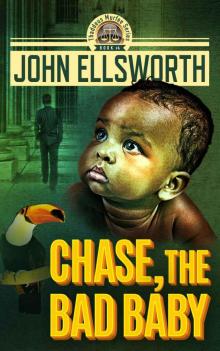 Chase, the Bad Baby: A Legal and Medical Thriller (Thaddeus Murfee Legal Thriller Series Book 4)
Chase, the Bad Baby: A Legal and Medical Thriller (Thaddeus Murfee Legal Thriller Series Book 4) The Girl Who Wrote The New York Times Bestseller: A Novel (Thaddeus Murfee Legal Thrillers Book 8)
The Girl Who Wrote The New York Times Bestseller: A Novel (Thaddeus Murfee Legal Thrillers Book 8) The Defendants: Crime Fiction & Legal Thriller (Thaddeus Murfee Legal Thriller Series Book 1)
The Defendants: Crime Fiction & Legal Thriller (Thaddeus Murfee Legal Thriller Series Book 1) Hellfire (Sisters In Law Book 2)
Hellfire (Sisters In Law Book 2) A Young Lawyer's story
A Young Lawyer's story Annie's Verdict (Michael Gresham Legal Thrillers Book 6)
Annie's Verdict (Michael Gresham Legal Thrillers Book 6) Legal Thriller: Michael Gresham: Secrets Girls Keep: A Courtroom Drama (Michael Gresham Legal Thriller Series Book 2)
Legal Thriller: Michael Gresham: Secrets Girls Keep: A Courtroom Drama (Michael Gresham Legal Thriller Series Book 2)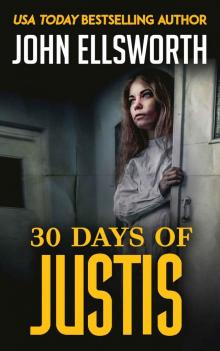 30 Days of Justis
30 Days of Justis Sakharov the Bear (Michael Gresham Legal Thrillers Book 5)
Sakharov the Bear (Michael Gresham Legal Thrillers Book 5)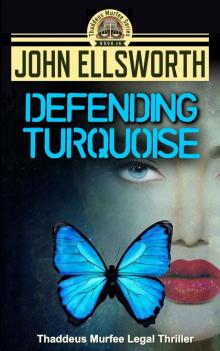 Defending Turquoise (Thaddeus Murfee Legal Thriller Series Book 5)
Defending Turquoise (Thaddeus Murfee Legal Thriller Series Book 5)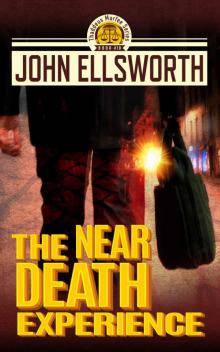 The Near Death Experience (Thaddeus Murfee Legal Thriller Series Book 10)
The Near Death Experience (Thaddeus Murfee Legal Thriller Series Book 10)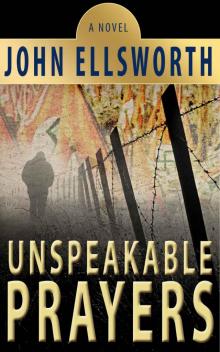 Unspeakable Prayers: WW II to Present Day (Thaddeus Murfee Series of Legal Thrillers)
Unspeakable Prayers: WW II to Present Day (Thaddeus Murfee Series of Legal Thrillers) Attorney at Large (Thaddeus Murfee Legal Thriller Series Book 3)
Attorney at Large (Thaddeus Murfee Legal Thriller Series Book 3) The Law Partners (Michael Gresham Legal Thriller Series Book 3)
The Law Partners (Michael Gresham Legal Thriller Series Book 3) Annie's Verdict
Annie's Verdict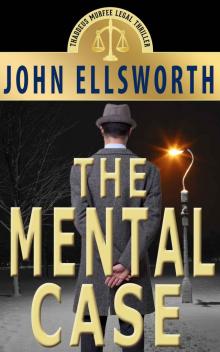 The Mental Case (Thaddeus Murfee Legal Thriller Series Book 6)
The Mental Case (Thaddeus Murfee Legal Thriller Series Book 6)